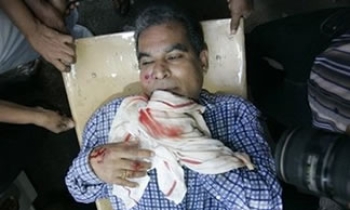Iran's leading reformist daily newspaper Hammihan (Compatriot) has been ordered closed, less than two months after it was allowed to resume publishing.
Hammihan, banned in 2000 by the hardline Iranian judiciary after the newspaper called for improving Iranian ties with the United States, had resumed publishing in May this year, publisher Gholamhossein Karbaschi told the Associated Press (AP).

Karbaschi said the judiciary maintained the latest closure was due to "faults in the legal proceedings" that led to lifting the ban on the paper in May. However, the closure notification also "ambiguously talked about Hammihan committing some crimes, but without elaboration."
"I think the rapid growth of Hammihan readership and its increasing impact on public opinion and its professionalism … made the paper the victim of a shutdown," Mohammed Atrianfar, the chief of the paper's editorial board and a reformist political figure, told the Los Angeles Times.
Tehran prosecutor Said Mortazavi said the paper's suspension was the result of procedural errors in the handling of Karbaschi's trial and incarceration for corruption from 1998 to 2000 after his 10-year tenure as mayor. Mortazavi said he had failed to appear in person at his trial as the rules required. He said Karbaschi had also left it to his lawyer to countersign the parole order which saw his release from jail. "So it was his lawyer who was tried and not him," Mortazavi told the official IRNA news agency.
Hammihan was launched in 2000 by former Tehran Mayor Karbaschi. He had been jailed after a falling-out with other Iranian political factions. His newspaper was shut down in mid-2000 after calling for closer relations with the United States. It also had printed flags of Iran and the US next to each other to illustrate then-Secretary of State Madeleine Albright's apology for the US role in overthrowing Iran's democratically elected government in 1953.

The decision to allow Hammihan to reopen had appeared to reflect a feeling among Iran's top leadership, composed of Shiite clerics, that the country must allow some opposition voice amid mounting discontent with hard-line President Mahmoud Ahmadinejad, the AP report said.
The clerical leaders control the judiciary and backed Ahmadinejad in the 2005 elections. But many former supporters have turned critical, saying Ahmadinejad has ignored economic woes and needlessly provoked the West in disputes over Iran's nuclear program.
The judiciary banned over 100 reformist papers during the final years of Ahmadinejad's predecessor, pro-reform President Mohammad Khatami — part of the struggle for power between reformists and hardliners.
Many writers for Hammihan are well-known reformists who have spent years in jail for opposing strict interpretations of Islamic rule by clerics and supporting democratic reforms.

According to the Los Angeles Times, the director of the Iranian Labor News Agency, the only news service that regularly covers the activities of nonprofit groups and unions, resigned amid rumors that his organisation might be shut down too.
Massoud Heidari, ILNA director, said he was resigning "in order to avoid further damage to ILNA." The phrasing was interpreted by some as a strong hint that authorities had pressured him to quit or close shop. "ILNA was the first nongovernmental news agency," Heidari wrote. "It really defended civil institutions and disseminated information of civil society." ILNA was established four years ago during the final years of the presidency of moderate Mohammad Khatami.









